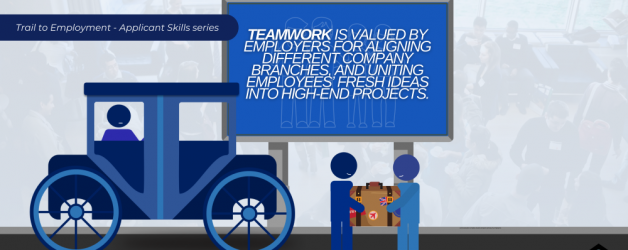Trail To Employment – Applicant Skills Series
Collaborating with a group of people towards a common goal is what teamwork is all about. The CICan Innovation Fund Project Report expands on the potential consequences a lack of teamwork could bring, even in job positions that require independent work from their employees. Employers emphasise teamwork is needed both within and with other departments to ensure the quality of products, services, and customer communication. Often referred to as collaborative skills, teamwork is strengthened during group projects: You conceptualise ideas, design plans, create content and deliver the outcome to an audience. From an employer’s viewpoint, the fact that students have reached agreed-upon solutions over disagreements (regarding key arguments or their presentation method) is crucial. You are prepared to give and receive constructive feedback which elevates your team’s output and increases the chances of achieving common goals. Collaborative skills are particularly strengthened during exchanges, in which you are expected to put vastly opposing worldviews to the side and reach a consensus over the choices beneficial to your projects. Being able to work with people from different countries is not only useful if you work for a multinational company but for any company with a diverse audience.
Collaborative skills refine your creativity. According to the Erasmus Competence Booklet, collaboration helps you learn more about yourself. The very division of tasks in a project is based on your qualities and interests. Being exposed to different scenarios, you ask your peers questions – which makes you conscious of your knowledge gaps – and are asked questions in return – which prompts you to reflect on and revise your proposals. Other than abandoning one’s perspective, teamwork teaches you to admit your perspective is not as self-evident as initially thought. When cooperating with others, you are given the chance to adopt parts of other peoples’ perspectives and integrate them into your own. This process informs you of better alternatives thus your point of view becomes inclusive. Lastly, teamwork includes trust, shared responsibility, and shared accomplishment. These results stem from the fact that you learn to ask for help.
Communication; Adaptability; Problem-solving; Teamwork; and Time- and Self-management are the top skills employers seek. These skills surfaced in the employer interviews conducted by Expertise in Labour Mobility (ELM) within the CICan Innovation Fund Project. This blog series called Trail to Employment – Applicant Skills presents each of their respective functions using the metaphor of a carriage, the vehicle needed on the trail to employment. In doing so, we direct students considering going to an exchange or approaching graduation on their path to the job market. The series concludes with a post proposing different ways you can convincingly argue how your international experience contributed to the acquisition and cultivation of those skills.
In summary, Teamwork is valued by employers for aligning different company branches and uniting employees’ fresh ideas into high-end projects. Within the carriage, teamwork is the wheels – different in size but firmly connected to the body – rotating so the vehicle can move while reducing friction so the passengers are comfortable. If you want to know about the final skill in our blogpost series that employers are looking for, click on the next post! (or if you have missed the previous blog posts dealing with other skills, look at the other blog entries)
Blog post written by Athina Tzanetou for Expertise in Labour Mobility
Images by Jizelle Ys for CareerProfessor.works
© 2024 CareerProfessor.works. All Rights Reserved.






